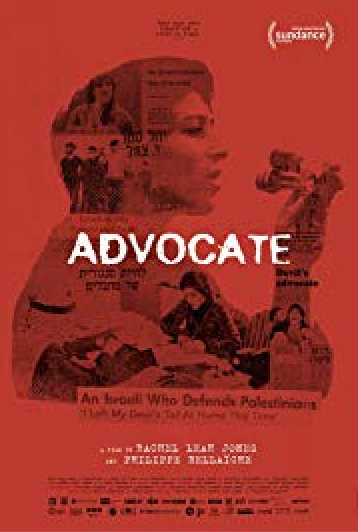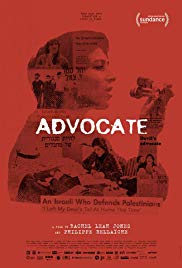
The Controversial Centerpiece of the Other Israel Film Festival
By Chanel Dubofsky
In 2015, Israa Jaabis’s car exploded at a checkpoint. The 33 year old Palestinian suffered first and third degree burns over 60 percent of her body and was charged with attempted murder.
It wasn’t intentional, Jaabis’s sister told Lea Tsemel, the Jerusalem lawyer at the center of the documentary, “Advocate,” directed by Rachel Leah Jones and Philippe Bellaiche. The explosion was a technical glitch, not a terrorist attack. Also, she told Tsemel, there was the fact that her sister had attempted suicide multiple times in the past.
 In a nutshell, Tsemel is the lawyer who takes on cases and clients that other Israeli lawyers wouldn’t dream of touching. In addition to Israa’s case, “Advocate” details Tsemel’s defense of Ahmad Manasra, a 13 year old Palestinian boy accused of stabbing Jews in the Jerusalem neighborhood of Pisgat Ze’ev, as well as the case of her own husband, the activist Michael “Mikado” Warschawski, one of the founders of Yesh Gvul, a movement founded in 1982 at the outbreak of the Lebanon War, by combat veterans who refused to serve in Lebanon.
In a nutshell, Tsemel is the lawyer who takes on cases and clients that other Israeli lawyers wouldn’t dream of touching. In addition to Israa’s case, “Advocate” details Tsemel’s defense of Ahmad Manasra, a 13 year old Palestinian boy accused of stabbing Jews in the Jerusalem neighborhood of Pisgat Ze’ev, as well as the case of her own husband, the activist Michael “Mikado” Warschawski, one of the founders of Yesh Gvul, a movement founded in 1982 at the outbreak of the Lebanon War, by combat veterans who refused to serve in Lebanon.
Tsemel never wins. As in, she tells the camera, her clients always end up serving time. The point of continuing is to challenge the Israeli court system, which has been corrupted by the Occupation. “Why appeal if you don’t believe in the courts?,” Tsemel is asked. She replies, “To change them.” (Both Jaabis’s and Manasra’s cases were reviewed by the Israeli Supreme Court, where some changes were made to their sentences). In her eyes, she’s resisting Israeli policy and action in the West Bank and Gaza by defending those who are also resisting. In spite of losing consistently, Tsemel sees the bigger picture. She may not be able to stop her clients from going to jail, she says, but she can push for them to see their families while there, for them to serve less time, and for better conditions in jail.
“Advocate” isn’t “just” a portrayal of Tsemel’s work or an assessment of how the politics of the Occupation have hijacked the Israeli justice system. It’s an indictment of media as well. In some scenes in the documentary, part of the screen is regular footage, and the other half an animated drawing of the same scene, set against a background of newspaper text, a nod to the difference between what we see and what we’re told exists, and the hold the mainstream media has over it all. There are moments we’re privy to as viewers allowed inside Tsemel’s office and in the courthouse that threaten to upend traditional depictions of Palestinians. In addition to the interview with Jaabis’s sister, in which we learn about her previous suicide attempts, there are the cameramen who glimpse Mansara as he heads into the courtroom for his indictment, the teen was smiling. “He was crying,” Tsemel shoots back. Who’s right – the person defending the boy who was interrogated by Israeli police while he had a skull fracture (major content warning here for the interrogation footage), or the media, who have spent their careers saturated in the narrative of the “bloodthirsty Palestinian”? It’s our job as the audience to decide.
And of course, we can’t (nor should we) ignore the fact of Tsemel’s experience as a woman doing this work. As a young mother, Tsemel was hardly able to “have it all” – she spent much time away from her children while working. She’s been verbally assaulted on the street by men who wish harm upon her children. Still, says her daughter, Talia, there is an atmosphere of respect that follows Tsemel. “The spell around my mother keeps her safe.”
In spite of any preconceived notions about a documentary where the protagonist lawyer loses more often than she wins, “Advocate” is hopeful. Tsemel is relentless, both in her work and in her belief that Israel is capable of doing better. “I’m a very optimistic angry woman,” she says, on the way to the Supreme Court at the very end of the film. “Hope is what keeps us going, otherwise we’d have given up a long time ago.”
Chanel Dubofsky writes fiction and nonfiction in Brooklyn, NY.
***STATEMENT FROM THE OTHER ISRAEL FILM FESTIVAL ABOUT “ADVOCATE”***
An Israeli city just canceled a screening of our opening night film ADVOCATE at a documentary film festival in northern Israel after pressure from Israel’s Culture Minister Miri Regev because they think the film glorifies terrorists! In addition, the Minister called for the removal of its award for Docaviv and the film was removed from the Cinema South Film Festival after controversy over one of the protagonists being arrested for being involved in shooting incidents.
The news of the Israeli Ministry of Culture calling to ban ADVOCATE and their attempt to remove this film in all these places timed with our upcoming screening of it here at the JCC Manhattan is what prompted our festival director Isaac Zablocki to make a statement and here it is below:
“The Other Israel Film Festival stands up for freedom of speech, and we are proud to share films that evoke thoughtful conversations. We do not believe in banning art or education. The freedom to present films, perspectives, and even to disagree are essential for a healthy democracy.”
One comment on “The Controversial Centerpiece of the Other Israel Film Festival”
Comments are closed.




If you interested in the ongoing conflict in western Asia this film is a must see.